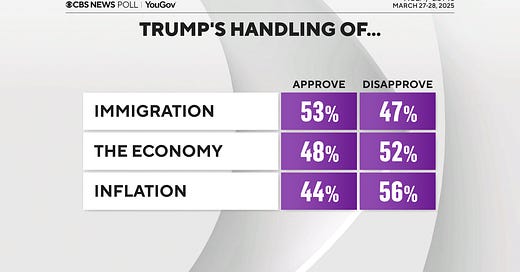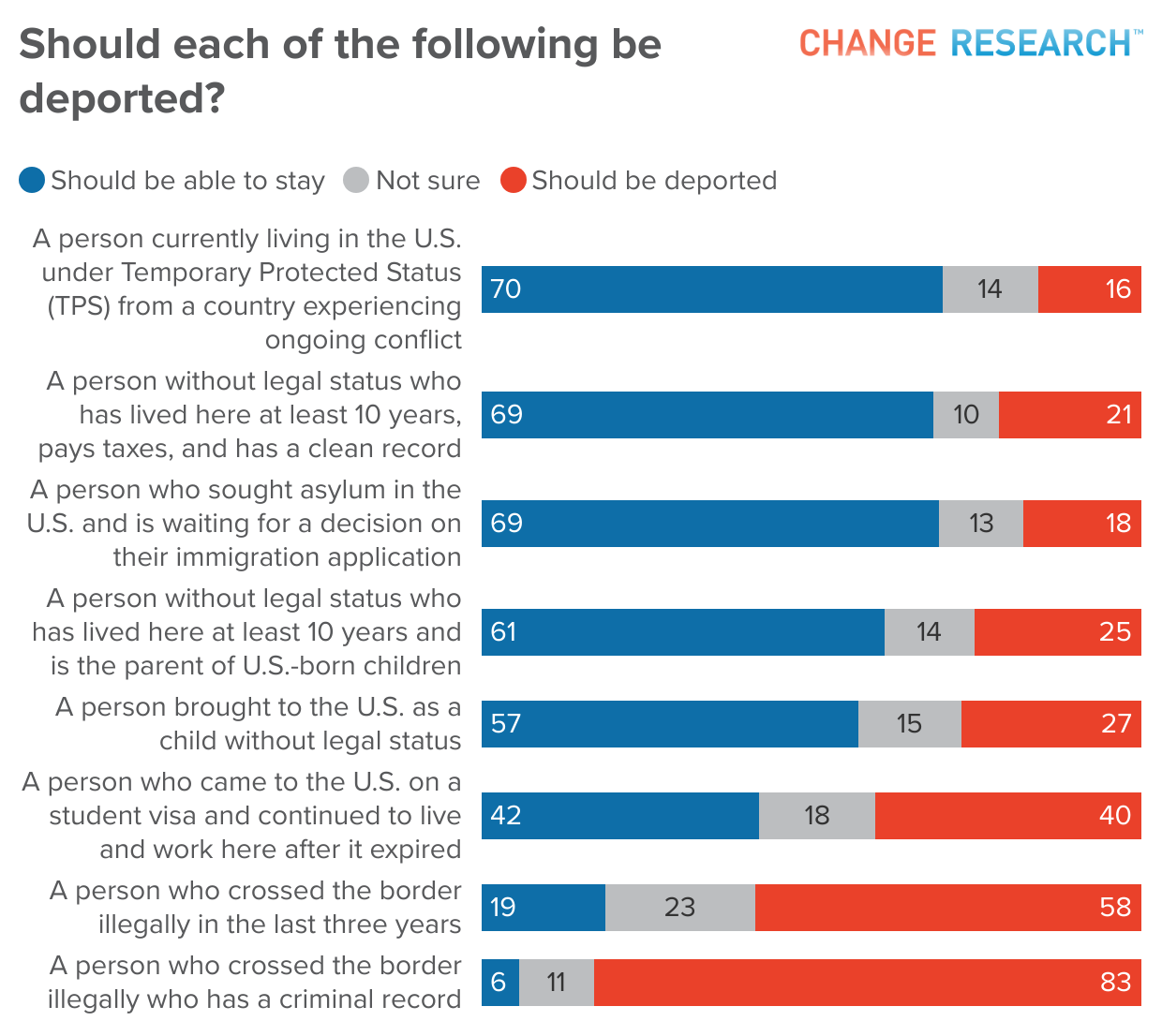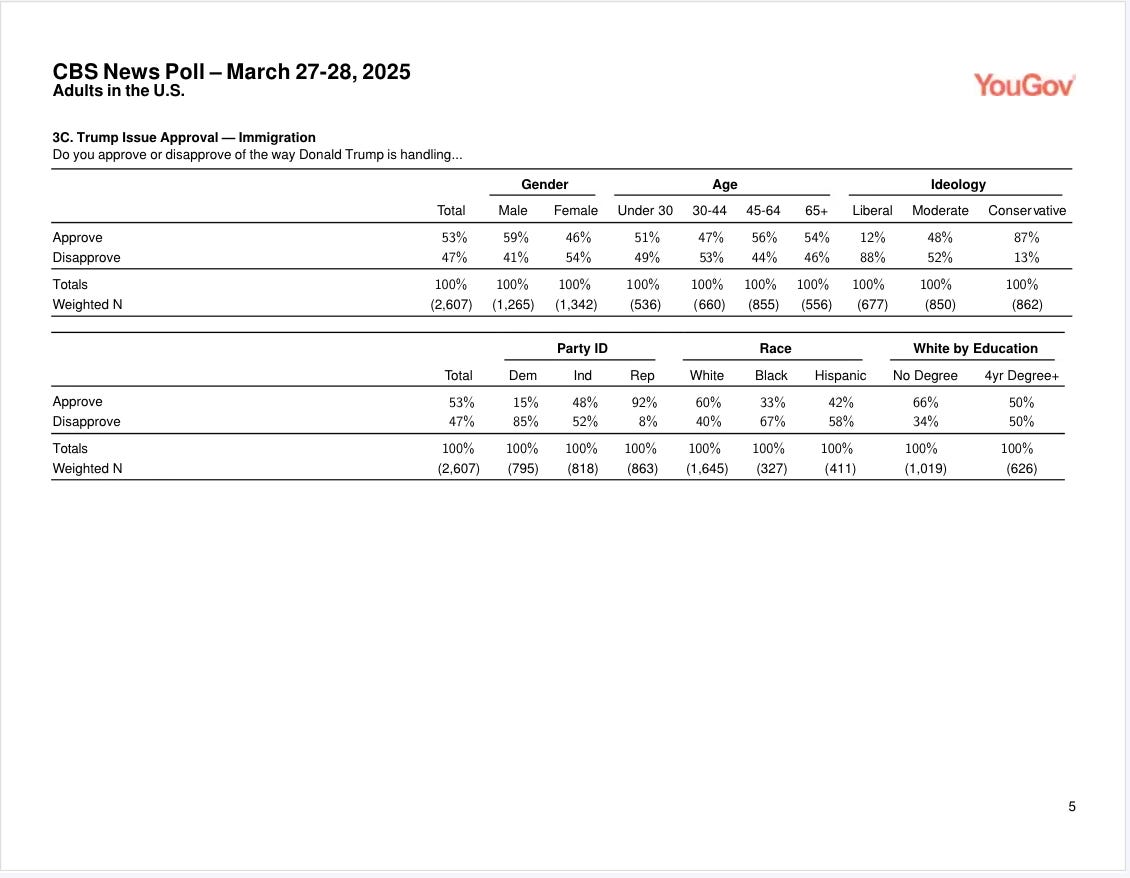Decision-makers are meant to use polls to help guide their decision-making. But a lot of times, decision-makers pick and choose which opinions they want to believe. Maybe they decide voters are liars. Or that the sample is skewed. Maybe they look at the top line number and ignore the cross tabs, or engage in cross tab trutherism.
There are a lot of problems with this way of interacting with data. But I want to focus on the biggest problem with it: it is utterly without leadership and accountability.
Here are a couple of clips that I think reflect this lack of leadership, lack of accountability, and a kind of subtle reliance on the literal polling results while also having remarkably little respect for the electorate.
Here’s example one:
Moskowitz says:
“I’m not gonna react to everything that Trump says in the moment that he says it… [reviews a list of Trump’s threats to invades various countries and declares he won’t actually do any of it] And so, you know, all of this distraction that he’s great at, that we kind of jump at all of the time, I’m trying to have a different strategy and take a step back. And, you know, we’ll have a quick response to it. But then just, you know, I’m just not going to have… I’m not going to be at a 10 all the time. I have to have degrees of outrage here. We can’t just always be at a 10. Just like everything isn’t a constitutional crisis. I hear that a lot nowadays. Oh, that’s a constitutional crisis. That’s a constitutional crisis. Well, if everything’s a constitutional crisis, nothings’s a constitutional crisis. And eventually, if Trump does disregard the Supreme Court and we do have a constitutional crisis, it won’t mean anything because we’ve already said everything else is a constitutional crisis.”
And here’s example two:
Gallego says:
“Well, because most Americans actually agree with what the president is doing on immigration and that’s actually one area where he’s still pulling, well he’s still at like 54 to 55% and one of the things that you know we have to focus on are - and I talk about this all the time - it’s like when we fight on the grounds of immigration, let’s fight smartly, right? So we should talk about the fact that we have for example a stylist who has no contact with the criminal world that was deported without due process. That’s a really good example but to overall argue that we shouldn’t be deporting criminals to El Salvador - I think it’s a very dumb argument that will politically, it’s not going to win because if you talk to a lot of people and you tell them, “hey, should we be deporting these hardcore criminals to another country since we can’t hold them in jail here anymore?” a lot of people are going to say, “absolutely”.
Now if you add “can we do that without due process” that’s when people understand, “no, obviously we need to have due process.” Due process is important obviously not just for the immigrants but also important for United States citizens because you will see, unfortunately from my experiences, you will see US citizens get wrapped up in this kind of stuff without due process, so we have to be very smart about how we fight when it comes to issues of immigration, border security.
I think a lot of what we want to do will sound very good among a little circle and bubble but when you get out and talk to real America including Latinos they’re going to agree a lot with what Donald Trump is doing and we have to figure out a way to kind of get in there with a precision strike of a good argument that kind of keeps our morals together but also allows us to have some type of ability to bring these voters back to us. So I get that and I was one person who after the election has been fairly critical of Democrats position on immigration and letting people know, by the way, most people in this country, they don’t want people to come here illegally, they are more likely to be in favor of deportations than not.
It just to me feels like something so much different. It’s designed to be different - it’s designed for you to get into this fight with him instead of focusing on the fact that he’s deporting mothers and children, the fact that he is, you know, causing some of them, a lot of foreign students that usually are great contributors to our economy to be missing. He wants you to fight him on this. There’s a reason why this is all happening right now. He wants us to be talking about these, majority of them, Venezuelan gang members that got sent over there, and he wants us to get into the nitty-gritty so we have to have arguments in public about due process knowing that the American public understands almost zero of it. Don’t get into the trap this is. Like, you know, if you see an ambush coming you have no responsibility to actually walk into that ambush.”
He goes on to say,
“I’m telling you right now, if you get into this fight over should we be sending people or not, you’re giving him the ground that he wants to fight for. The individual cases - fight for the actual stylist that we’re talking about, but if you try to get into this bigger argument you’re losing, and that’s where they want you to be. They want you to be on that losing ground because then we have to explain due process, we have to explain why it’s different for these gang members versus non-gang members. Like it’s just not smart.
This party is going to outsmart itself, if you ask me.
So, what should they do instead?
It’s my firm belief that the Democratic Party should be commissioning a proper, fulsome investigation into What Went Wrong. I’ll write a later post looking back at the way the Republican Autopsy in 2012 was conducted — because while I think it was an extremely worthy enterprise, I also can see exactly how they got the results they got, and why they would not have seen a charismatic populist demagogue coming down the pike.
It’s also my firm belief that Democratic strategists and campaign managers need to rethink both the way they do research, and the way they make sense of the research.
Moskowitz and Gallego represent a kind of conventional wisdom of centrist Democrats. They work back from what they think of as “results”.
In Moskowitz’s telling, the Democrats were too hysterical in the first Trump term, and that “didn’t work” — by this I suppose he means that it did not turn back the tide of the MAGA takeover, and did not prevent Trump from running again. I might submit to him that the problem was not being “a 10 all the time” about everything Trump did — even if I agree that’s what Democrats did last time (which I’m not sure I do), I would also suggest that they did so insincerely. Sarah Longwell, of The Bulwark, talks a lot about how the Democrats said during their 2024 campaign that democracy was on the line, but they did not act like democracy was on the line. Grassroots Democrats were pretty amped about it, but the candidates and electeds were far more subdued. They look at their excitable colleagues and conclude that because they did not sweep and hold Congress, gain durable majorities in the Senate, and drive Trump out of electoral politics forever, therefore sounding the alarm is a losing strategy.
The result proves it, right?
Let’s talk about immigration/deportations specifically.
In Gallego’s telling, Trump polling at “54-55%” on immigration is proof that mass deportations are broadly popular. Let’s set aside that public opinion on immigration varies widely depending on the way the question is worded. As Gallup put it, “Public opinion on a complex issue like deportation defies simple summarization.”
Change Research just published their own polling digging deeper into the subject of deportations and found this set of results:
So where does this 50-ish percent support number come from? I’m guessing it came from a CBS/YouGov poll reported on shortly before Gallego’s Pod Save America interview.
In the CBS News article about the poll, the slide they showed looked like this:
Cool. Now, take a look at this, in the PDF at the bottom of the same article:
When you look at Trump’s approval on immigration, ideology, party ID, and race/education are major drivers of the response.
87% of those with conservative ideology approve; 88% with a liberal ideology disapprove; moderates are split, but slightly skew disapproving.
92% of Republicans approve; 85% of Democrats disapprove; and again, Independents split with a slight disapproving skew.
60% of white respondents approve; 67% of Black, and 58% of Hispanic respondents disapprove.
66% of whites without a college degree approve; whites with a college degree or more are evenly split.
The majority view is held in an awfully lopsided way.
Who elected you?
There’s a line from William Gibson I like (many, actually), about how the future is here, it’s just not evenly distributed. Public opinion is the same. A “majority” may view something a particular way, but that majority view isn’t evenly distributed across all kinds of voters.
It’s also not evenly distributed across the specifics of the issue.
So it is flatly bizarre to hear politicians hand-wave the specifics of the issue, specifics upon which people agree with what is, in theory the Democrats’ position.
It is flatly bizarre to think that every opportunity to distinguish yourself from the opponent, to criticize or fault them, is a mere distraction, a temptation to be lured into a trap. We can’t criticize the autocrat for denying people their civil liberties because that’s what he wants us to do.
So, let him?
More and more it appears that the dominant theory of electoral success among Democrats has never veered from the DLC theory of triangulation, pioneered, they say, by Dick Morris:
“In this strategy, Clinton would stand firm on partisan Democratic positions when they were popular. On issues where Republican positions were more popular, however, Clinton would take advantage of the current Republican Congress’s tendency to overreach: he would make major concessions from conventional Democratic policies and adopt centrist positions that would have broader support than the Republicans’ offerings.
Here are the three sides of the triangle:
When Democratic positions are popular, including among Republican voters, stand by them.
When Republican positions are popular, except among base Democratic voters, stay out of the fight.
When Republican positions are popular among most Americans, but their policies are extreme, adopt the position but propose a more moderate, often partial, solution to the problem that everybody is more comfortable with.
You see — the third way.
I wrote about this previously with respect to Chuck Schumer. Centrist Democrats believe that the main metric of leadership success is electoral success. Their theory of how to achieve electoral success is simple: persuade Republicans to vote for Democrats.
That seems… hard.
It seems, in fact, much harder than a more traditional approach, one that the Republicans use to pretty good effect: mobilize your own voters to turn out, demotivate your opponents’ voters, and persuade a majority of Independents to vote for you.
My question for Gallego and Moskowitz is this: if they think that sitting out major fights, not standing on business, not standing by principle is a good strategy for persuading independents, and independent-minded Republicans to vote for Democrats, do they think they can persuade enough of them to counteract the disaffected actual Democrats who will “choose the couch”?
As a general matter, it’s true that it’s cheaper to acquire a new customer than it is to keep an old one. But you don’t want the loss of old customers to outpace the acquisition of new ones. That is called losing.
Voters can stay out of it, too.
There are a great many emerging narratives about Why the Democrats Lost in ‘24. We’ll get to them all, I’m sure, eventually. But, one battleground is over the question of turnout.
On one side of the field is David Shor, of Blue Rose Research who offers many analyses (some much more legible than others), but concludes something that might shock many Democrats:
“As a result of these changes, we’re seeing the reversal of a decades-long truism in American politics. For a long time, Democrats have said, and it’s been true, that if everyone votes, we win and that higher turnout is good for Democrats. But this is the first cycle where that definitively became the opposite.
“I have some numbers here: If only people who had voted in 2022 had voted, Harris would have won the popular vote and also the Electoral College fairly easily. But if everyone had voted, Trump would have won the popular vote by nearly five points.”
The analysis applied here is that every group that is more working class, earns less money, does not get a college degree, and is less generally engaged in politics (in other words, the majority of voters), is becoming more likely to vote for Trump.
Okay, but:
In this analysis, the authors find:
“Registered Democrats made up a much larger share of non-voters (15.2 million or 38.8%) than registered Republicans (7.7 million or 19.6%), with Independents/Other affiliations constituting the largest group (16.3 million or 41.6%). This means that nearly twice as many Democrats as Republicans sat out the election—a stark contrast to claims that increased turnout would benefit Republicans.
…
“We can reasonably assume that at most 10% of registered Democrats would have voted for Trump, and at most 10% of registered Republicans would have voted for Harris—though these crossover rates were likely even lower. The critical variable remains how Independents and those with other affiliations would have voted. In this more nuanced scenario, Harris would have needed at least a 30% share of Independents to win the popular vote. Conversely, Trump would have needed Independents to break for him by more than a 2:1 margin to secure the popular vote. Notably, given the partisan composition of non-voters, a 10% crossover rate among opposition partisans would have benefited Trump more than Harris.”
In the end, the authors state a simple electoral strategy:
For success in 2026, Democrats need to:
1. Give their base compelling reasons to turn out
2. Give disaffected voters currently unhappy with both parties reasons to support them
I certainly don’t speak for all Democrat base voters, but I feel fairly confident that dancing around the ring avoiding punches and never even throwing one isn’t going to turn out the base, give disaffected voters a reason to support them, or frankly, persuade any Republican swing voters to swing left.
One more thing: moral clarity
Voters may not be experts or specialists or altogether engaged in politics or policy. They may be just trying to make rent and eking an extra gallon out of the tank to get to the next gas station.
And that’s about to get even harder.
But one thing I think we can tell from the polls is that people aren’t nearly as cruel as it can seem.
These results suggest that people can distinguish between people with criminal records crossing the border illegally, recent illegal crossings, and people who pursued legal paths to stay in the United States. They want to help people who qualified for TPS - refugees. They want to keep people who work here, stay out of trouble, and pay their taxes. They want parents to stay with their children. They want children to stay with their families.
There is a word for this kind of sense-making: ethical, or if you like, moral.
Democrats need to learn how to demur and traverse from the specifics of any particular deportee to the moral position. There is a moral position on due process - you don’t have to understand the technical merits. You just have to know that everyone has a right to plead their case before their lives, livelihoods and liberty are taken from them. To say otherwise is despotism.
There is a moral position even on the gang members: it is immoral to lie to the courts in order to extraordinarily render people to foreign prisons with no possibility of recourse for what are often quite petty crimes. If they can do it to these guys, they can do it to anyone. Because they’re doing it through fraud. When you lie to the courts you are lying to the people, and we should never allow that.
People actually can tell you what they want — they are telling us what they want in these more detailed polls — but you still have to show it to them.
When I hear Moskowitz argue that “nothing’s a constitutional crisis”, I believe him. He thinks this is just a game. A game we can all just ride out. A game in which, eventually, the round ends, and a new deck is shuffled, new cards dealt. But it’s not a game. It’s people’s lives.
A party that can not show moral leadership in a time of autocratic takeover should begin to ask itself whether it deserves to win.









